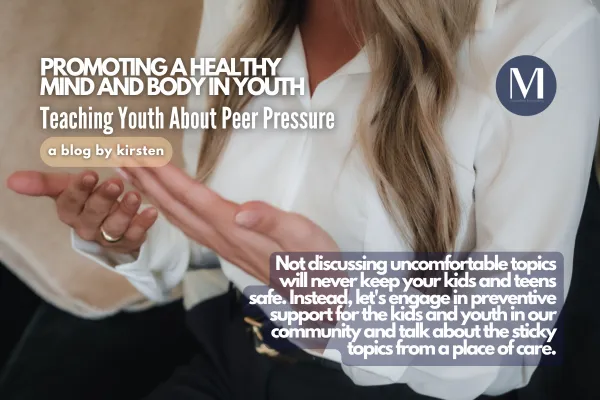the blog
A place for our team to share about topics they are passionate about, in hopes of allowing you to see and understand a bit more behind the faces on these pages.

Promoting A Healthy Mind and Body in Children & Youth: Teaching Youth About Peer Pressure
Discussing peer pressure with your kids and teens is important for their well-being. You can begin by teaching them that another word for a friend, classmate or buddy is called a peer. Peers can encourage us to make healthy choices or influence us to make choices that will not keep us or others safe and when this happens it is called peer pressure. Share with the child or youth in your life that it is natural as they build friendships to have a desire to fit in with others. However, it is also important that they do not change who they are for others, such as alternating their interests and dropping hobbies because friends or classmates do not like the same things.
Explain to your children that peers can have a big influence on their life due to spending many hours of time together at school, sports, after school clubs and during weekends. Discuss with your teen the different peer pressures they could face such as influencing them to bully others, trying drugs or alcohol, looking at pornography, shoplifting, vandalizing, sending naked photos and or videos, etc. As we talk about these topics, try asking your child and teen open ended questions without judgement, such as if you were pressured to engage in an unsafe activity what would you do? What adult would you talk to for help and it does not have to be me? Another way of encouraging communication is transferring the narrative to friends so it takes the pressure and focus off of your child or teen. For example, have any of your friends felt pressured by peers? How did they react to the peer pressure? Did they do anything well, what would have you changed?
Lastly, remind your children and teens that people pleasing to gain friends is not worth their safety or well-being. Remind them to walk away, share with an adult and set boundaries. Remember, we set kids up for success when we talk about the uncomfortable things in life so they can be informed versus blind sided, while also giving them tools to protect their well-being.
Remember not discussing uncomfortable topics will never keep your kids and teens safe. Instead, let's engage in preventive support for the kids and youth in our community and talk about the sticky topics from a place of care. We can do this by educating them on understanding consent, setting boundaries, healthy screen time, preventing bullying and saying no to peer pressure.
Office Location: 1200 Brock Street South, Whitby, ON. L1N 4L9
© Marquis Counselling & Consulting | ALL RIGHTS RESERVED | TERMS & CONDITIONS | PRIVACY POLICY
